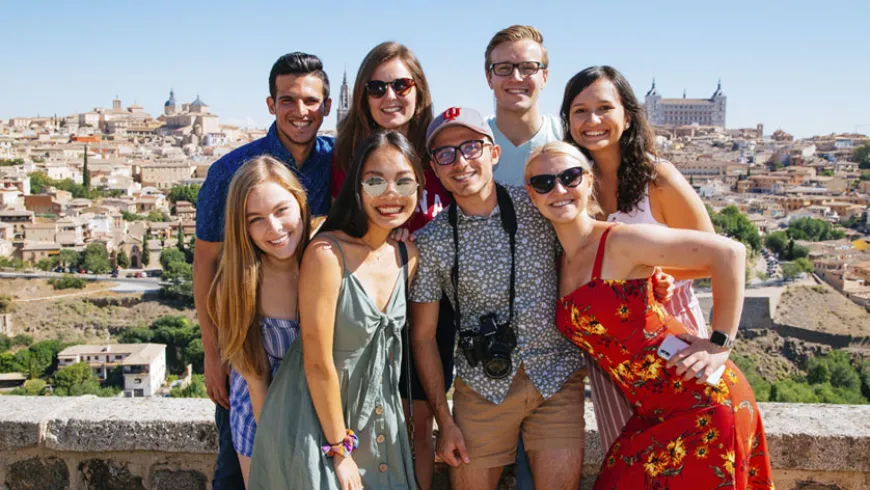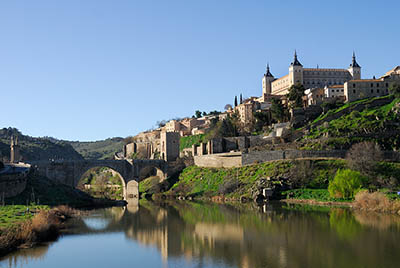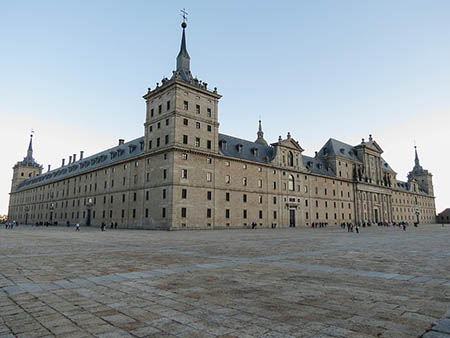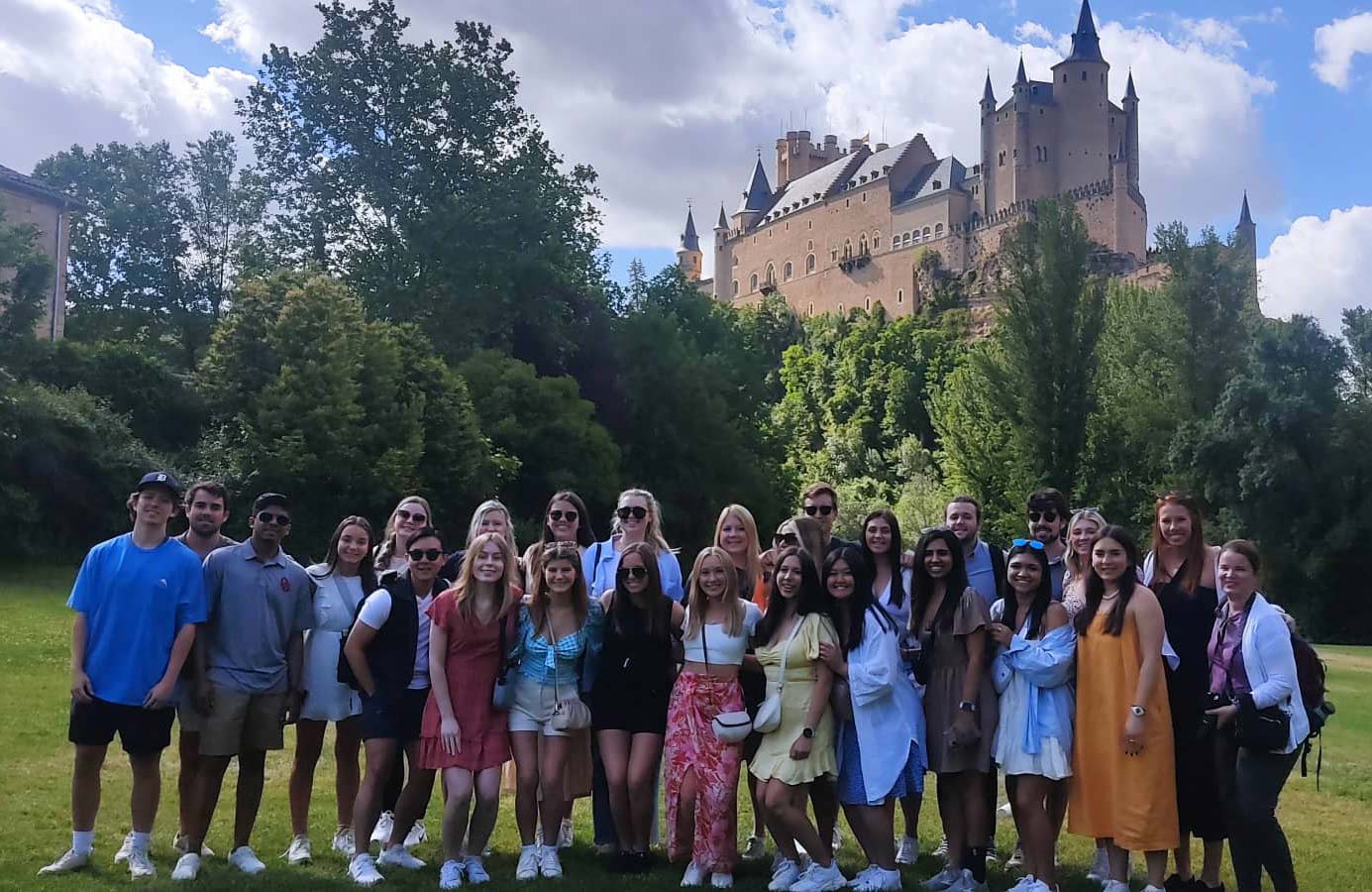
The Orientation Sessions in Alcalá provide incoming students with useful and practical information about the Universidad de Alcalá and Instituto Franklin-UAH. Relevant features of the program are discussed including: academic information, course registration, medical insurance, accommodation, public transportation, and practical information, to introduce students to the different aspects of Spanish culture.
The orientation includes two guided tours; a walking tour of the city of Alcalá de Henares and another one around the historical center of Madrid.
Students are required to take a language placement test before the beginning of the program.
Students may choose to live with a host family in Alcalá de Henares or reside at the dorms. Host families are carefully vetted and supervised. A large number of the families selected have extensive experience hosting our students. While living with a host family students have three meals a day, laundry and weekly cleaning. Host families are also required to provide internet access.
Host families are diverse and located throughout Alcalá de Henares. Depending on the location of the host families, students may have to walk 20-30 minutes to get to Instituto Franklin-UAH, where classes are held, or they can use public transportation.
Students may get a monthly transportation pass for approximately 20€ (people under 26 years old). This pass has access to all public transportation services and unlimited rides throughout the region of Madrid. The dorm is located in the center of Alcalá and is a 5-minute walk to Instituto Franklin-UAH.
Instituto Franklin-UAH has a Housing Coordinator who ensures the satisfaction of students, host families, and dorms. The Housing Coordinator offers continuous support to students, and provides mediation between the student and the host family or dorms when needed.
Our housing coordinator will match host families to those students with special diets that wish to have the experience of living with a family, however, not all families may be able to provide these special diets. If it were not possible to place a student with a host family due to a special diet, we will place the student at the dorm, where different menus will be provided.
At the dorms, students receive three meals per day and may request a special diet. Laundry service is not included, however, students have access to laundry facilities within the residence hall.
All students must obtain the health insurance offered by Universidad de Alcalá to participate in the program. This is a private health insurance. During the orientation sessions, students are given a medical card as well as all the necessary information related to its use, and information about the clinics for medical care. In Alcalá de Henares there are two clinics near the Institute where students can make appointments or go for emergency consultations.
We recommend students with special medical conditions to contact the Undergraduate Student Advisor, Antonio Fernández, to have needs met. (antonio.fernandezm@uah.es).
At the beginning of the academic period, Instituto Franklin-UAH offers a scheduled pick-up service from Barajas Airport to Alcalá. If you are interested in using this service, please fill out this form.
If we do not receive your flight information 15 days before the beginning of the program, we will understand that you do not want to use this service, and you will be responsible for your arrival and transport to Alcalá.
Activities and cultural visits
One of the key features of the program is the cultural and practical component of the courses; our environment is our classroom. In this sense, all courses offer a diverse and interesting range of cultural activities that bring the learning experience beyond the classroom. These activities not only facilitate the specific acquisition the language, but also provide with a greater direct experience of the culture and history of Spain.

Toledo is one of the Spanish cities with the greatest wealth of monuments. It is known as the “city of three cultures'' due to the coexistence of Christians, Arabs, and Jews. They lived together for centuries behind its walls. Toledo preserves an artistic and cultural legacy in the form of churches, palaces, fortresses, mosques, and synagogues. This great diversity of artistic styles makes the old quarter of the capital of La Mancha a real open-air museum, which has led to its declaration as a World Heritage Site. In this city, there are very clear signs of the presence and coexistence of the three medieval cultures that shaped the society and culture of Spain. Through this visit, students will understand its complexity trough the interpretation of the historical legacy left by Jews, Muslims and Christians in the city.

The monastery of El Escorial represents one of the most relevant historical monuments of Imperial Spain. Built under Phillip II, it embodies all values of the Absolute Monarchy, but also offers one of the most brilliant collections of art and architecture of the times.
Museo del Prado is one of the most important museums in the world. It contains some of the most impressive collections of art from medieval times to the nineteenth century. Students can see and admire some of the best Spanish and European paintings from artists such as Bosch, Titian, Rubens, Velázquez, Zurbarán, Murillo, Goya, etc.

Segovia was declared a World Heritage Site by UNESCO in 1985. The Roman aqueduct was built in the first century AD. It is considered the best preserved Roman work in Spain. Its Old Town is one of the most monumental in Spain, highlighting one of the most spectacular palaces of medieval times among many other churches and medieval palaces.

The Royal Palace of Madrid with more than 135,000 square meters, is the largest in Europe, and almost twice the size of the Palace of Versailles. Its almost 3,418 rooms and halls have witnessed the most recent history of Spain. The Palace houses one of the most important historical-artistic heritages in Europe, including important collections of musical instruments, such as the Stradivarius; paintings by Velázquez and Goya, among other national and international painters.
All tours include:
Bus/ Train transportation to sites.
Entrance to selected monuments.
Accompaniment of one or two professors of the Institute.
Guided Tour of the city.

